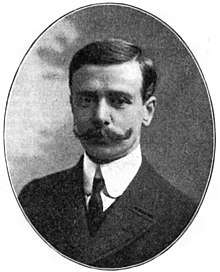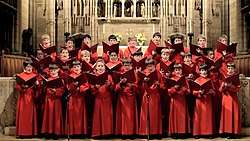T. Tertius Noble
Thomas Tertius Noble (May 5, 1867 – May 4, 1953) was an English-born organist and composer, resident in the United States for the latter part of his career.

He served as organist and choirmaster at a number of churches including Ely Cathedral in England and St Thomas Episcopal Church in New York City. He is chiefly remembered for his music for the Anglican church.
Early life and education
Noble was born on 5 May 1867 in Bath, England.[1]
In his youth, Noble was introduced to the pipe organ by James Pyne, organist at Bath Abbey, and from 1880, Noble was tutored in the organ at Gloucester Cathedral. The young Noble was appointed organist at All Saints' Church, Colchester, where he was also educated by the rector. Noble won a scholarship to attend the Royal College of Music, where he was tutored by Walter Parratt, Charles Villiers Stanford and Frederick Bridge.[2]
Career

After Noble graduated from the Royal College of Music in 1889, he was appointed a member of staff there, teaching the organ. Noble also took the position of organist at the Church of St John the Evangelist, Wilton Road, in London.[2]
In 1890, Stanford recommended him to fill the vacancy as his assistant organist at Trinity College Chapel, Cambridge. Noble was dissatisfied with the quality of singing and Stanford's bad temper.[3]
Noble left Trinity in 1892 to serve as organist and choirmaster at Ely Cathedral. Whilst there, he married the daughter of the dean of Ely, Muriel Maud Stubbs. From 1898 to 1913, Noble served as organist at York Minster, a post he held for 14 years. At York, he established the York Symphony Orchestra, and composed pieces for them. In 1910, revived the York Festival.[2]
In 1913, Noble moved to America after accepting the post of organist and choirmaster of St Thomas Episcopal Church in New York City. He was responsible for establishing a choral tradition at St Thomas's along Anglican cathedral lines. He also oversaw the installation of a new organ at St Thomas's and founded the Saint Thomas Choir School for boys in 1919. This was Noble's final position which he held for 35 years.[2]
Noble composed orchestral and chamber music, but is now remembered for his music for the Anglican church, particularly his Evening services in a A major, B minor and A minor, and his anthems Go to dark Gethsemane, Souls of the Righteous, and Grieve not the Holy Spirit. His tunes were used for seven hymns in The Hymnal of the Protestant Episcopal Church in the United States of America, 1940.[4] His tune Ora labora for the hymn Come, labour on is well known in the United States, as is his edition of Handel's Messiah, published by G. Schirmer in 1912.
Death
Noble died on 4 May 1953 in Rockport, Massachusetts and he was buried at Beech Grove Cemetery there.[5] The hymn tune Rockport composed by Noble was named after the city of his death.[1]
T. Tertius Noble was the uncle of English jazz composer and actor Ray Noble (1903–1978).[6]
| Preceded by Will C. MacFarlane |
Organist & Choirmaster, Saint Thomas Church, New York 1913–1943 |
Succeeded by T. Frederick Candlyn |
Citations
- McKim, LindaJo H. (1993). The Presbyterian Hymnal Companion. Westminster John Knox Press. pp. 154–155. ISBN 978-0-664-25180-2. Retrieved 11 January 2020.
- "Tertius Noble | Biography & History". AllMusic. Retrieved 11 January 2020.
- Dibble, Jeremy (2002). Charles Villiers Stanford: Man and Musician. Oxford University Press. p. 219. ISBN 978-0-19-816383-1. Retrieved 11 January 2020.
- The Hymnal of the Protestant Episcopal Church in the United States of America, 1940, "Index of Composers, Sources, Arrangers", p. 813.
- "T. Tertius Noble". Find a Grave. 5 May 1867. Retrieved 11 January 2020.
- Wilson, John S. (4 April 1978). "Ray Noble, 71, Dies; Popular Composer". The New York Times. Retrieved 11 January 2020.
References
- J.A. Fuller-Maitland, H.C. Colles, rev. Duncan J. Barker: "Noble (Thomas) Tertius", Grove Music Online ed. L. Macy (Accessed 15 September 2005), http://www.grovemusic.com
- Frank A. McConnell, F.A.G.O.: "Memories of T. Tertius Noble", lecture delivered to the Lancaster, PA, Chapter of the American Guild of Organists, March 13, 1989, http://www.bluzeandmuse.com/oldMarkGeocities/music/fam_memNoble.txt (McConnell was a student of Noble and was his assistant during Noble's last years at St. Thomas.)
External links
- Free scores by T. Tertius Noble in the Choral Public Domain Library (ChoralWiki)
- Free scores by T. Tertius Noble at the International Music Score Library Project (IMSLP)
- T. Tertius Noble & the St Thomas Choir School - The First Century on YouTube
- "Hymn tunes by T. Tertius Noble". hymnary.org. Archived from the original on 12 January 2020. Retrieved 12 January 2020.
- Go to Dark Gethsemane (mp3, organ only)